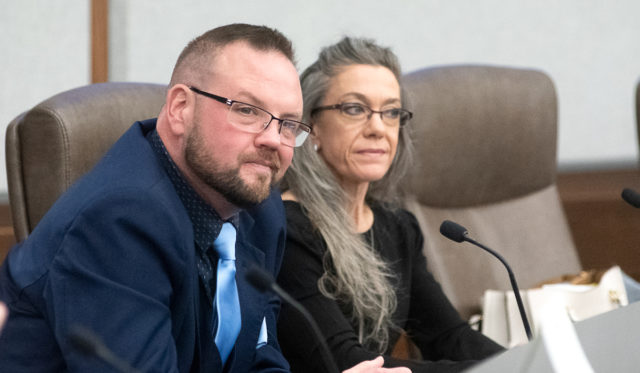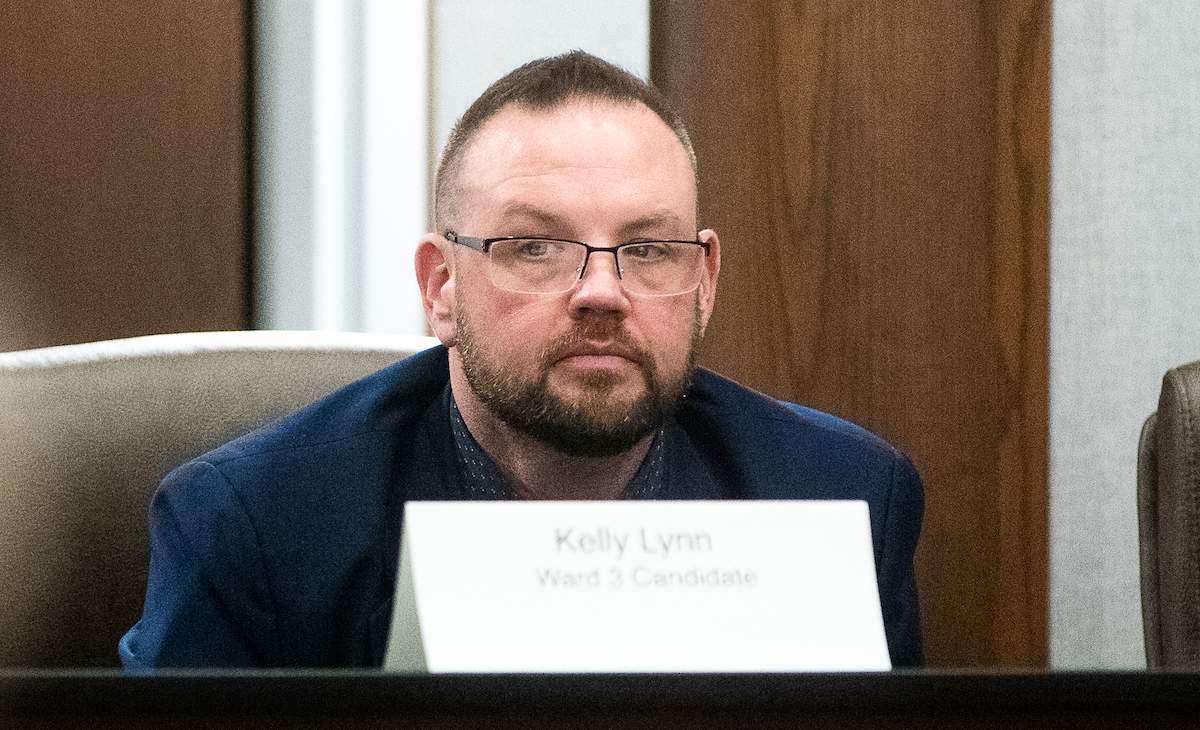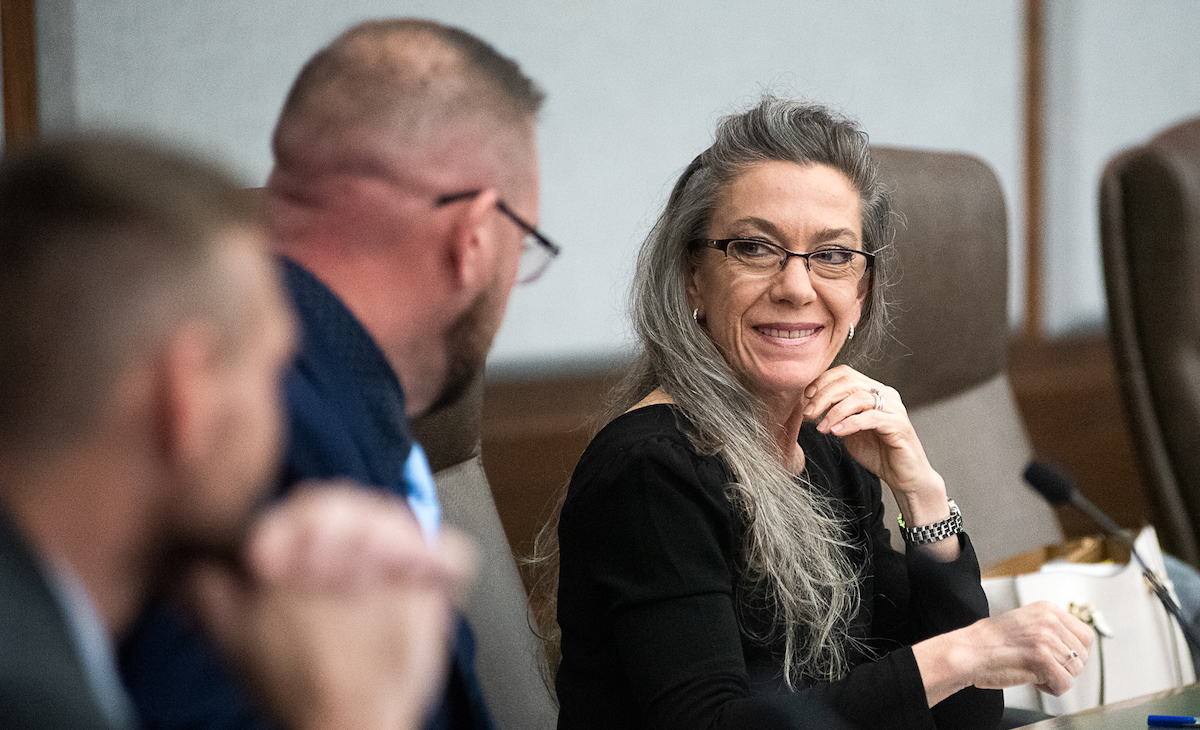

A question over the legal implications of incumbent Norman Ward 3 City Council member Kelly Lynn becoming a municipal judge in Wewoka has complicated his bid for reelection and has caused lawyers to prepare for a court battle.
Norman City Attorney Kathryn Walker contends that Lynn, a lawyer, vacated his council seat when he took the judgeship on Jan. 9, citing a state statute that prohibits public officials from serving dual offices. The city attorney intends to file a lawsuit in Cleveland County District Court to remove Lynn from office.
Meanwhile, Sen. Rob Standridge (R-Norman) has asked Oklahoma Attorney General Gentner Drummond to weigh in on the matter with a legal opinion.
Although the unresolved legal issue does not impact Lynn’s qualification as a candidate for reelection on Tuesday, it does raise a question about how it may sway voters. Lynn, an outspoken conservative incumbent, is being challenged by certified public accountant Bree Montoya for the northwest Norman seat. Lynn was elected in 2020, made headlines for a bizarre bar altercation with a 66-year-old woman and is seeking his second term in office.
The matter involving Lynn’s appointment as a municipal judge in Wewoka also raises the legal question of what effect it may have on the validity of any Norman City Council actions in which Lynn has voted, if it is later determined that he inadvertently vacated his Ward 3 seat.
An added twist to the Norman Ward 3 race also occurred this week, when election officials discovered 36 of 150 absentee ballots sent to voters in one precinct of Ward 3 inadvertently omitted the Lynn-Montoya race.
‘Legal work for another city’

The question of Lynn’s legal status as city councilman arose on Jan. 27 when the Norman city attorney prepared a legal memorandum concluding that Lynn becoming a municipal judge in Wewoka on Jan. 9 — while simultaneously serving as a Norman city councilman — violated the dual office prohibition of a state statute.
The memo, written by assistant city attorney Rick Knighton, raised the concern that any votes taken by Lynn subsequent to assuming the judgeship invalidated Norman City Council actions.
In an interview Tuesday night, Lynn said the city attorney’s legal memo was a misreading of the law. He said the whole matter is politically motivated to harm his bid for reelection. He said he has made enemies at city hall because of his outspoken criticism of certain departments and questions he has asked about what he believed were improprieties.
“It is all nonsense,” Lynn said, claiming that he had cleared his plan to be a part-time municipal judge in Wewoka with Norman city officials before he took the job. “I ran this all through the city manager and city attorney before I did it. I asked them if one could serve in a legal capacity as a city judge and in another office. They said, ‘No problem.’ All thumbs up.”
Walker, the city attorney, declined to discuss the matter with NonDoc. Instead, she provided her Feb. 7 memorandum emailed to Mayor Larry Heikkila and other City Council members detailing related events, including Lynn’s prior conversations with her and City Manager Darrel Pyle.
“[Lynn] did ask the city manager several months ago if it would be a conflict of interest for him to do legal work for another city,” Walker wrote. “Mr. Pyle later asked me, and I said he could represent another city provided the other city didn’t have interests in opposition to Norman. Mr. Pyle and I both understood ‘legal work for another city’ to mean representing another city as a lawyer, not as a municipal judge.”
On Jan. 24, Walker and Pyle met with Lynn, who told them their legal conclusions were wrong. On Jan. 27, Walker hired attorneys John Dorman and Andy Lester at the Spencer Fane law firm to research the issue.
“Violating the dual office holding prohibition could implicate decisions council makes and the determination of a quorum at council meetings, so it was very important to me that this issue be given due consideration,” Walker wrote in the Feb. 7 memo to councilmembers. “At the same time, I do not relish playing a role in something that affects a councilmember’s ability to serve. Thus, it was critical to be thorough.”
Norman city councilmembers were first made aware of the matter on Tuesday night, when Walker’s email and memo popped up on their cell phones during a study session over utility rates.
The email also contained the conclusions of Dorman, a noted municipal law attorney.
“The councilman ran afoul of 51 O.S. §6 and vacated his Norman City Council seat when he accepted the municipal judgeship in Wewoka,” Dorman wrote. “Thus, by mere operation of law, he is no longer a member of the Norman City Council. The City Council may declare the seat vacant and appoint a successor for the remainder of the councilmember’s term or may seek a declaratory judgment from the Cleveland County District Court.”
Ward 3 election pits Kelly Lynn vs. Bree Montoya

News of the “dual office” controversy has Kelly Lynn concerned that it may benefit his challenger, Bree Montoya, a local CPA and former business manager of the University of Oklahoma College of Nursing.
Montoya said she knew nothing about the dual office issue until this week when hearing about it on the news.
Montoya is making her first appearance in politics, although she has served on several nonprofit civic boards in Norman, including the Norman Music Festival and the Norman Arts Council.
Lynn has raised about $6,000 more than his challenger, reporting contributions of $22,754.28 compared to Montoya’s reported contributions of $16,855. (Final contribution reports will be filed after the election.)
Both candidates favor bond issues that would increase property taxes to fund certain community projects.
“I want to rebuild public trust in city government and staff,” Montoya said.
She said there is a distrust among voters, as shown by the recent failure of several bond issues, including a stormwater initiative in 2019.
“The fact is, we don’t have a solution to stormwater flooding. It’s just going to get worse the more we grow, and as development happens we are going to have less ground for stormwater to soak into,” Montoya said. “I want to make sure that any development is looked at — let’s not just paint concrete all over the place.”
Among the most significant contributors to Lynn’s election in 2020, and again reported in campaign finance filings with the city clerk on Feb. 2, were local home building developers.
Lynn has said he strongly favors the $343.9 million Norman Public Schools bond proposals that will also be on residents’ Feb. 14 ballot. The bond proposals include building a stand-alone facility for the Oklahoma Aviation Academy at the Max Westheimer Airport. Lynn said that would make Norman the center of aviation in the state and boost Oklahoma as a leader in the aerospace industry, bringing high-paying jobs to the area.
“I hope you have some trust to pass that school bond because that will be one of the most amazing high schools in the entire world,” Lynn told those attending a recent candidate forum conducted by the League of Women Voters. “I want to raise the standard of living in Norman. I don’t want to do the things that bring it down.”
One of the issues that may separate Lynn and Montoya is the role the city government plays in addressing the problem of homelessness.
Montoya said the city should assist in finding temporary housing for the homeless, although it may be limited.
“I typically don’t think the city’s role is to be 100 percent the body to get people off the streets, but we can help other organizations help the people to get off the streets,” she said.
Lynn, however, has opposed any city funding for homeless shelters, preferring churches and nonprofit organizations lead the effort. In response to a question posed during the forum about providing affordable low-income housing to address the homelessness problem, Lynn said the increased cost of housing is not a negative.
“That means Norman is on the rise,” he said. “I’m sorry, but there are a lot of places that I cannot afford to live.”
Montoya, meanwhile, recently responded to a post in the Norman Ward 3 Facebook group showing a booking photo of her after an alcohol-related arrest. Although no records appear on the state’s court network website, Montoya commented on the post and acknowledged making “some past mistakes.”
“It’s been brought to the attention of the voters of Ward 3 I’ve made some past mistakes. These mistakes have been shared with the public via this Facebook post. This post has dealt with a part of my past life I am not happy with and am embarrassed it happened,” Montoya wrote. “While I acknowledge that I made some mistakes in the past that led to my arrest, these mistakes in no way impact my ability to serve the citizens of Ward 3. Again, I am sorry and I’m not proud of this. I certainly wasn’t hiding anything. I didn’t realize running for City Council would bring out the ugly in people.”
Ballot mix up and the legal issue of ‘dual office’
The Lynn-Montoya race had another unexpected twist this week when Cleveland County Election Board Secretary Bryant Rains said 36 of 110 absentee ballots sent to voters in Ward 3 inadvertently omitted the City Council candidates.
“It was just human error. A mistake. I have no excuses for it,” Rains said.
He asked absentee voters to look at their ballots closely. If the Ward 3 council race is missing, Rains asked voters to call the election board office immediately to obtain a new ballot.
Rains said once ballots are mailed in or delivered to the election board they cannot be resubmitted. Absentee voters can also hand deliver their ballots to the election board office by 5 p.m. Monday.
Any Ward 3 ballots cast which omit the race could be the subject of a post-election candidate challenge to the outcome, should the race be decided narrowly.
Meanwhile, lawyers are preparing for what may be a legal fight over Lynn’s current seat on the city council.
At issue is whether Title 51, Section 6 of Oklahoma statutes — which prohibits, with some exceptions, a person from holding dual public offices — applies and triggers the removal of Lynn from the council.
The initial legal memorandum prepared by Norman’s assistant city attorney said violation of the “dual office” prohibition was a misdemeanor, but it was unclear if a councilman could be prosecuted, given the previous position would be automatically vacated upon the person taking the second office.
Knighton, the assistant city attorney, cited a 1946 Oklahoma Supreme Court opinion that held once a public office holder accepts a second office it operates to ipso facto vacate the first office, raising the question of the propriety of official actions taken by a councilman who has vacated the office.
Knighton specifically referenced Lynn in the memo, writing that once the second office is accepted, then “further participation as the Ward 3 councilman for the city may jeopardize any items Councilmember Lynn considers.”
Lynn said he and his law partner, Michael Amend, met with Walker and Pyle on Feb. 3 to discuss the matter.
“They thought I was going to come in and resign. Well, that was impossible,” Lynn said.
Oklahoma Constitution, state statute at issue
This week, Lynn hired Norman attorney Tracy Schumacher to represent him in the matter. On Wednesday, she sent a letter to Knighton and outside counsel Lester at the Spencer Fane firm criticizing their opinion that Lynn’s simultaneous work as both city councilman and a municipal judge was illegal.
Schumacher said regardless of whether the City Council declares Lynn’s seat vacant or seeks some declaratory judgment to that effect in district court, Lynn may bring his own lawsuit to protect his position on the City Council.
She said the Oklahoma Constitution carves out an exception for municipal judges to also practice law or hold other public offices. That provision, Article 7, section 11(b), states:
No Justices or Judges, except those of Municipal Courts, shall engage in the practice of law nor hold any other office or position of profit under the United States or this State or any municipal corporation or political subdivision of this State, nor shall hold office in any political party.
However, the city’s lawyers believe a 1980 state attorney general opinion interpreting that constitutional provision narrowly applies only when the municipal judge is serving another city as a municipal judge — not any other office, such as a city councilman.
The “dual office” prohibition statute also has 30 exceptions, one of which Lynn’s lawyer believes applies to him. That exception states:
Any person holding a county or municipal office or position, or membership on any public trust authority, who is a member of a board or commission that relates to federal, state, county or municipal government and is created by the United States government, the State of Oklahoma or a political subdivision of the state, except where the duties of the offices or positions conflict.
The Dorman legal memo states that neither that exception nor any other exception to the statute applies in this case.
The city’s attorneys also argue that the Oklahoma Judicial Ethics Advisory Panel issued a 2000 opinion that an attorney is ethically required to resign a municipal judge position prior to running for election in a non-judicial position.
Meanwhile, new Attorney General Gentner Drummond confirmed that Sen. Rob Standridge has asked him for a legal opinion on whether a city councilman can also serve in the capacity of a municipal judge under Oklahoma law. However, a backlog of other requests from public officials may delay a formal response.
On a related matter garnering significant public discussion, Drummond said his office has not received a formal request to give an opinion on whether new Superintendent of Public Instruction Ryan Walters can simultaneously receive a salary as secretary of education in Gov. Kevin Stitt’s administration.
What the City of Norman may do next
Oklahoma statutes do not give power to elected municipal officials to determine the qualifications of other sitting elected officials. But the Norman City Charter does grant the City Council authority to declare a seat “vacant” if reasons are found to exist. The charter states a council vacancy exists when the office holder “ceases to possess some qualification for the office (…) or by applicable law.”
Dorman, the city’s contracted attorney, advised Norman officials they could place an item on the agenda for an upcoming City Council meeting to declare Lynn’s seat vacant and appoint a successor to serve out the remainder of his term (through June 30), including appointing Lynn back to his seat on the council if he resigns his judgeship.
Instead, the City Council may wait for the outcome of a lawsuit. In her report to the mayor and councilmembers on Tuesday, Walker, the city attorney, said she intends to go forth with filing a petition for a declaratory judgment in Cleveland County District Court this week, but the matter would likely not be resolved for several weeks.
The next Norman city council meeting is Tuesday, the night of the election. (The agenda will not be published until Friday at 5 p.m.)
Lynn blames political opponents for raising the issue
When city councilmembers received Walker’s email about the matter Tuesday night, Lynn was pacing a corridor of city hall waiting as a consultant presented a study on possible future utility rate increases via a Zoom linkup in the council’s meeting room.
“The question is, why am I being asked about all this now?” Lynn said.
He said if there were concerns about his work as a municipal judge, city officials should have brought the matter up in early January, instead of so close to the election.
Knighton’s memo on the matter was dated Jan. 27, about two and a half weeks after Lynn was sworn onto the bench in Wewoka. Lynn said the fact that Knighton’s legal memo was anonymously sent to journalists proved that his political opponents were attempting to influence the election.
Schumacher said the attempt to question Lynn’s legal status as city councilman was suspicious for its timing.
“If it had come up right after he became municipal judge, that would be one thing. But now, right before the election, that is something else,” she said.
Schumacher said she believes forces at city hall are trying to keep her client’s voice from being heard.
“There has been an awakening in the city of Norman to start watching these city elections that were ignored for so long,” she said. “This action less than one week before Kelly Lynn’s election is interference with the citizens who are going to be voting in this election.”
Read Kathryn Walker’s Feb. 7 memo
 Loading...
Loading...
(Correction: This article was updated at 11:55 a.m. Friday, Feb. 10, to reflect accurate reported fundraising totals. NonDoc regrets the error.)




















